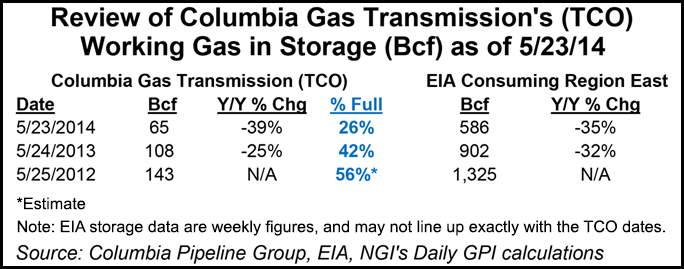Markets | Infrastructure | NGI All News Access | NGI The Weekly Gas Market Report
Columbia Pipeline Storage Continues at Low Levels
As it looks to replenish natural gas supplies on its system, Columbia Pipeline Group (CPG) said its current storage inventory is off by more than one-third compared with the same period last year. Meanwhile, some of its customers are taking advantage of lower gas prices by over-scheduling deliveries.

According to Columbia Gas Transmission (TCO), the company had 65.2 Bcf in storage last Friday, a 39.5% decrease from 107.7 Bcf in storage one year earlier and less than half of the 143.2 Bcf on hand two years ago.
TCO added that net storage injections beginning April 1 through last Friday totaled 36 Bcf, the lowest mark since at least 2003, the earliest year the company reported. The second-lowest mark for net storage injections occurred in 2012, at 40 Bcf.
Also in the East, Dominion Transmission is not faring well on storage refills. As of May 22, DTI had 76 Bcf in storage compared to 129 Bcf on May 23, 2013 and 203 Bcf on May 24, 2012.
In the Midwest, a recent assessment by the Michigan Public Service Commission (PSC) predicts a much lower storage build in that state for this coming winter. The PSC expects a storage build by the end of October of 499.4 Bcf, out of a maximum working capacity of nearly 675 Bcf, compared with last year’s assessment at this time, which called for 612.5 Bcf in storage at the end of October 2013 (see related story).
“As readily evident, storage inventories remain low,” TCO reservoir services manager Rich Fulcher said during an operations update Wednesday.
Fulcher said figures from the U.S. Energy Information Administration (EIA) showed working gas in underground storage totaled 1.27 Tcf on May 16. “Storage is starting to head into the right direction. [But] still, in order to approach the historical Nov. 1 inventory positions, a significant quantity of gas remains to be injected. We encourage you to continue these injections at the current pace to reduce the likelihood of injection restrictions later this summer.”
Storage inventories in three of TCO’s operating areas — Area No. 2 (New York) at 48%, Area No. 4 (south central Pennsylvania) at 39%, and Area No. 8 (southwest Pennsylvania and northwest West Virginia) at 50% — were fuller than in other areas, but Fulcher said this was causing problems.
“These areas are filling more rapidly than desired,” he said. “[It’s] not desirable as flexibility for service offerings will be diminished as storage fills, very possibly leading to further restrictions this summer.
“The other real challenge continues to be the bulk of Area No. 5 [northern Ohio], No. 7 [Ohio] and No. 3 [West Virginia]. These areas are where storage supplies remain low and storage capacity is high.” TCO said storage inventories in those areas were 21%, 25% and 17%, respectively.
Fulcher reiterated that CPG had extended the maximum monthly injection quantity (MMIQ) for customers in April to 20% of storage contract quantity (SCQ), up from 15% (see Daily GPI, April 4). MMIQ as a percentage of SCQ was forecast to remain unchanged from May through August (20%), in September (13%) and in October (7%).
CPG’s Bruce Ruhlin, managing director of gas control and planning, cautioned that some customers were over-scheduling market deliveries, in turn causing the company operational problems. CPG posted an operational advisory on Tuesday.
“We’re seeing situations where customers have been scheduling receipts in the northeastern part of our system — Areas Nos. 2, 4 and 8 — and scheduling deliveries into that same area. When they schedule a receipt and delivery into that area, it does not have to pass through a constraint, so the nomination is confirmed and scheduled, but when the customer doesn’t take the scheduled volume it creates problems for us.
“At this time we’ve been asking customers to voluntarily cooperate and avoid over scheduling to those markets. We’re getting cooperation from customers on that, and as long as we do get enough cooperation we won’t have to impose other restrictions, but there is some risk that we may have to implement restrictions such as OFOs [operational flow orders] or other restrictions to control this activity.”
© 2024 Natural Gas Intelligence. All rights reserved.
ISSN © 1532-1231 | ISSN © 2577-9877 | ISSN © 1532-1266 |
